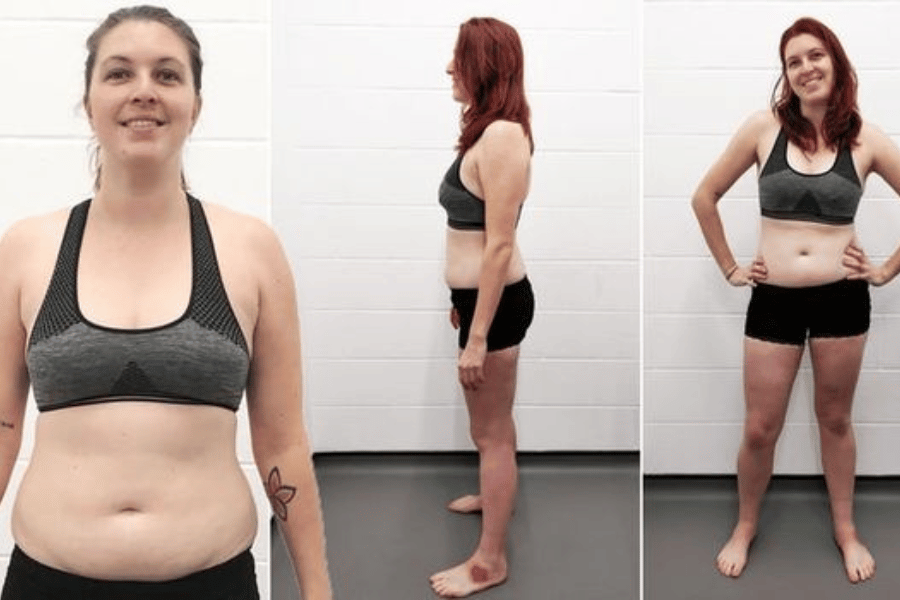Welcome to a comprehensive guide on addressing one of the most common challenges faced by women during menopause – the dreaded “menopause belly.” In this section, we’ll dive into the intricacies of abdominal weight gain that often accompany this life stage and explore the concept of the best weight loss for menopause belly. Let’s set the stage for your journey towards effective strategies to combat this specific issue.
Menopause is a transformative phase in a woman’s life, but it can also bring about changes in our bodies that we may not welcome, such as weight gain. Among the various areas where women tend to notice changes in body composition, the abdomen stands out. Many women find that they accumulate excess weight around the belly, which can be frustrating and challenging to address.
The good news is that you’re not alone in this journey, and there are effective ways to manage and even reduce menopause belly fat. In the following sections, we’ll explain why menopause often leads to abdominal weight gain, delve into the hormonal and metabolic changes behind it, and highlight the importance of targeted weight loss strategies tailored to address this specific issue.
So, if you’re ready to take control of your health and bid farewell to menopause belly, let’s explore the best approaches together. It’s time to embrace change with confidence and proactive health management during menopause.

The Challenge of Menopause Belly
Menopause, a significant milestone in a woman’s life, often brings an unwelcome companion – weight gain, particularly around the abdomen, commonly referred to as the “menopause belly.” This section explores why menopause frequently leads to abdominal weight gain and the hormonal and metabolic factors contributing to this specific challenge.
Hormonal Changes and Weight Gain
- Estrogen Decline: As women enter menopause, the levels of estrogen, a hormone that influences body fat distribution, decrease significantly. This hormonal change is a key factor in the accumulation of abdominal fat.
- Metabolic Slowdown: Menopause coincides with a natural decline in metabolic rate due to aging. The decrease in metabolic efficiency can contribute to weight gain, especially if dietary and activity levels remain unchanged.
Understanding Menopause Belly
- Body Fat Redistribution: With the onset of menopause, many women notice a shift in how and where their body stores fat. The decrease in estrogen levels often leads to a higher concentration of fat around the midsection, rather than hips and thighs.
- Visceral Fat Accumulation: The fat that accumulates during menopause is often visceral fat, which surrounds internal organs. It is linked to various health risks, including heart disease and diabetes.
Highlighting the importance of targeted weight loss strategies for menopause belly, this section underscores the need for a best weight loss for menopause belly approach that is both effective and mindful of the unique challenges posed by this life stage. Understanding these changes is crucial for developing strategies to manage and reduce menopause-related abdominal weight gain effectively.

Effective Weight Loss Strategies for Menopause Belly
In this section, we will delve into the most effective weight loss strategies tailored specifically for addressing menopause belly. It’s essential to understand that not all weight loss methods are equally effective, especially when it comes to targeting abdominal fat during menopause.
Dietary Adjustments Tailored for Menopause Belly
The Role of Nutrition
To effectively combat menopause belly, it’s crucial to make dietary adjustments that consider the unique challenges posed by hormonal changes during this life stage. Research conducted by leading nutritionists and experts in menopausal health emphasizes the importance of a balanced and nutrient-dense diet.
Key Recommendations
- Incorporate a variety of colorful fruits and vegetables into your meals, which are rich in vitamins, minerals, and antioxidants.
- Focus on lean protein sources like poultry, fish, and tofu to support muscle mass and metabolism.
- Opt for whole grains over refined carbohydrates to maintain stable blood sugar levels.
- Don’t forget the healthy fats from sources like avocados, nuts, and olive oil, which can help with hormonal balance.
Mindful Eating
Incorporating mindful eating practices can be a game-changer when it comes to menopause belly. By paying attention to hunger and fullness cues, you can prevent overeating and make more mindful food choices.
Expert Insights
Leading health professionals recommend techniques such as slowing down while eating, savoring each bite, and listening to your body’s hunger signals.
Beneficial Physical Exercises for Targeting Abdominal Fat
The Importance of Exercise
Exercise is another cornerstone in the battle against menopause belly. It’s not just about losing weight but also about improving overall health and well-being.
Expert Opinions
Prominent fitness trainers and healthcare providers stress the significance of regular physical activity in managing menopausal weight gain.
Targeted Abdominal Exercises
While any form of exercise is beneficial, incorporating specific workouts that target the abdominal area can yield better results.
Exercise Recommendations
- Engage in core-strengthening exercises like planks, leg raises, and crunches.
- Incorporate aerobic activities such as brisk walking, cycling, or swimming to burn calories and reduce overall body fat.
- Consult with a fitness professional to create a tailored exercise plan that addresses your individual needs.
Citing Expert Opinions and Research
Throughout this section, we’ve drawn insights and recommendations from reputable experts in the fields of nutrition, fitness, and menopausal health. Their research and practical experience underscore the effectiveness of these strategies in achieving weight loss for menopause belly.
By combining the right dietary adjustments with targeted physical exercises, you can take proactive steps to combat menopause belly and improve your overall health. Remember that consistency and patience are key, and it’s essential to consult with a healthcare provider before making significant lifestyle changes.

Practical Solutions and Lifestyle Changes
Now that we’ve explored the challenges posed by menopause belly and identified effective weight loss strategies, it’s time to discuss practical solutions and lifestyle changes that can help you achieve your goals. Implementing these recommendations into your daily life can make a significant difference in your journey toward a healthier, more confident you.
Providing practical advice for implementing the best weight loss for menopause belly strategies
1. Meal Planning and Portion Control
One of the most impactful steps you can take is to plan your meals mindfully. Consider the following:
- Balanced Meals: Ensure your meals include a balance of lean protein, whole grains, healthy fats, and plenty of fruits and vegetables.
- Portion Control: Pay attention to portion sizes to prevent overeating. Using smaller plates can help you naturally reduce portion sizes.
2. Regular Physical Activity
Incorporating exercise into your routine is crucial. Here’s how to make it manageable:
- Consistency: Aim for at least 150 minutes of moderate-intensity aerobic activity or 75 minutes of vigorous-intensity aerobic activity every week, as recommended by health experts.
- Variety: Mix up your exercise routine to prevent boredom and engage different muscle groups.
3. Adequate Sleep and Stress Management
Quality sleep and stress reduction are often overlooked but essential factors in menopause weight loss:
- Sleep: Aim for 7-9 hours of quality sleep per night. Poor sleep can disrupt hunger hormones and affect your metabolism.
- Stress Reduction: Practice stress-reduction techniques such as meditation, deep breathing, or yoga to manage cortisol levels, which can contribute to abdominal fat.
4. Stay Hydrated
Proper hydration is often underestimated but plays a significant role in overall health:
- Water: Drink plenty of water throughout the day. Sometimes thirst can be mistaken for hunger.
5. Seek Support and Accountability
Don’t embark on this journey alone. Consider:
- Support System: Share your goals with friends or family members who can offer encouragement and join you on your path to a healthier lifestyle.
- Accountability: Tracking your progress, whether through a journal or a fitness app, can help you stay accountable.
6. Consult a Healthcare Provider
Before making significant changes to your diet or exercise routine, consult with a healthcare provider, especially if you have any underlying medical conditions.
Remember that achieving and maintaining a healthy weight during menopause is not just about appearance but also about overall health and well-being. Embrace these practical solutions and lifestyle changes with determination and patience, knowing that each positive step you take brings you closer to your goal of the best weight loss for menopause belly.
Conclusion
Addressing menopause belly and achieving the best weight loss for menopause belly is a journey that requires understanding, commitment, and patience. We’ve explored the challenges posed by abdominal weight gain during menopause and delved into effective strategies to combat this specific issue.
It’s important to remember that menopause belly is unique, and the approaches to tackle it should be tailored accordingly. By making dietary adjustments, engaging in beneficial physical exercises, and following the expert-backed advice provided in this guide, you can take meaningful steps toward a healthier and more confident you.
We encourage you to embrace these changes with confidence and a positive mindset. The path to weight loss during menopause may have its challenges, but with determination and consistency, you can achieve your goals.
We hope this guide has been informative and helpful in your journey to conquer menopause belly. If you have any questions or would like to share your thoughts on this topic, please feel free to do so. Your feedback and experiences can inspire and guide others on the same path to better health and well-being.
FAQ Section: Common Questions Answered
As we conclude our comprehensive guide on the best weight loss strategies for menopause belly, we want to address some common questions that often arise on this topic. These frequently asked questions provide further insights into managing and effectively reducing menopause belly fat.
Q1: What makes menopause belly different from other types of weight gain?
Menopause belly fat is distinctive because it tends to accumulate around the abdominal area due to hormonal changes. Unlike other forms of weight gain, menopause belly fat is often more stubborn and resistant to traditional weight loss methods.
Q2: How can diet specifically target weight loss for menopause belly?
A diet tailored for menopause belly focuses on nutrient-dense foods, portion control, and managing hormone fluctuations. It includes foods rich in fiber, lean proteins, and healthy fats while minimizing processed sugars and saturated fats.
Q3: What are the most effective exercises for reducing menopause belly?
Effective exercises for reducing menopause belly fat include core-strengthening workouts, cardiovascular exercises, and resistance training. Engaging in activities like planks, jogging, and weightlifting can help target abdominal fat.
Q4: How long does it typically take to see results from these weight loss strategies?
The time it takes to see results varies from person to person. With dedication to a healthy diet and regular exercise, you may start noticing changes in a few weeks to a few months. Consistency is key to achieving long-lasting results.